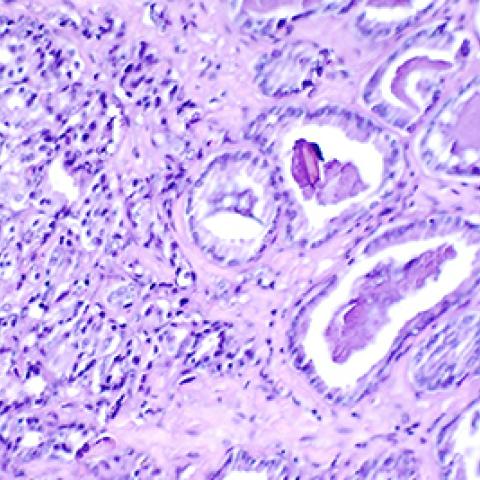
Histological slide showing prostate cancer
Photo credit: NCI Visuals Online
Patients with relapsed or metastatic prostate cancer may be eligible to participate in a new clinical trial at the NIH Clinical Center.
Liza Lindenberg, M.D., of the Molecular Imaging Program, is leading the Center for Cancer Research’s effort in a study of an experimental way to view tumors in men whose prostate cancer has relapsed after treatment or has spread to other parts of the body. Most forms of prostate cancer have receptors for prostate-specific membrane antigen (PSMA), a protein that helps fuel the development of prostate cancer cells. 68Ga-PSMA-R2 is an experimental radiotracer that investigators hope will help them better identify sites of prostate cancer throughout the body. When 68Ga-PSMA-R2 is injected into a patient’s bloodstream, it binds to PSMA and accumulates in tumor tissue. A PET/CT scanner can then trace the gallium-68, the radioactive element of 68Ga-PSMA-R2, so that a doctor can see images of prostate tumors and know precisely where they are in the body. This study aims to determine whether 68Ga-PSMA-R2 is safe and more effective than other imaging methods at finding sites of the cancer in the body.
Clinicaltrials.gov identifier: NCT03490032
NCI Protocol ID: NCI-18-C-0111
Official Title: A Phase 1/2 Open-label, Multi-center, Safety and Tolerability Study of a Single Dose of 68Ga-PSMA-R2 in Patients With Biochemical Relapse (BR) and Metastatic Prostate Cancer (mPCa)
The Center for Cancer Research is NCI’s internal cancer center, a publicly funded organization working to improve the lives of cancer patients by solving important, challenging and neglected problems in cancer research and patient care. Highly trained physician-scientists develop and carry out clinical trials to create the medicines of tomorrow treating patients at the world’s largest dedicated research hospital on the campus of the National Institutes of Health in Bethesda, Maryland.
For more information on CCR clinical trials click here, and subscribe to have the latest CCR clinical trials sent directly to your inbox.